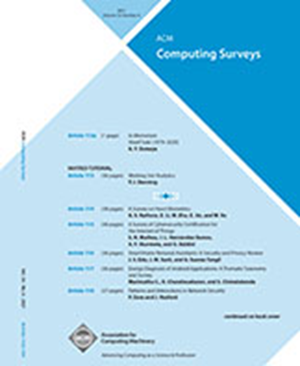The Federation Strikes Back: A Survey of Federated Learning Privacy Attacks, Defenses, Applications, and Policy Landscape
IF 23.8
1区 计算机科学
Q1 COMPUTER SCIENCE, THEORY & METHODS
引用次数: 0
Abstract
Deep learning has shown incredible potential across a wide array of tasks, and accompanied by this growth has been an insatiable appetite for data. However, a large amount of data needed for enabling deep learning is stored on personal devices, and recent concerns on privacy have further highlighted challenges for accessing such data. As a result, federated learning (FL) has emerged as an important privacy-preserving technology that enables collaborative training of machine learning models without the need to send the raw, potentially sensitive, data to a central server. However, the fundamental premise that sending model updates to a server is privacy-preserving only holds if the updates cannot be ”reverse engineered” to infer information about the private training data. It has been shown under a wide variety of settings that this privacy premise does联邦反击战:联盟学习隐私攻击、防御、应用和政策环境调查
深度学习在广泛的任务中显示出令人难以置信的潜力,伴随着这种增长的是对数据的贪得无厌的需求。然而,实现深度学习所需的大量数据都存储在个人设备上,最近对隐私的担忧进一步凸显了访问这些数据的挑战。因此,联邦学习(FL)已经成为一种重要的隐私保护技术,它使机器学习模型的协作训练成为可能,而无需将原始的、可能敏感的数据发送到中央服务器。然而,将模型更新发送到服务器是保护隐私的基本前提只有在更新不能被“逆向工程”来推断关于私有训练数据的信息时才成立。在各种各样的设置下,这个隐私前提都不成立。在这篇调查论文中,我们对FL中不同的隐私攻击和防御方法进行了全面的文献综述。我们确定了这些攻击的当前局限性,并强调了可以破坏FL客户端隐私的设置。我们进一步剖析了FL的一些成功的工业应用,并为将来的成功采用吸取教训。我们调查了FL隐私监管的新兴格局,并总结了FL未来的发展方向,以实现生成准确模型的珍贵目标,同时保护其参与者的数据隐私。
本文章由计算机程序翻译,如有差异,请以英文原文为准。
求助全文
约1分钟内获得全文
求助全文
来源期刊

ACM Computing Surveys
工程技术-计算机:理论方法
CiteScore
33.20
自引率
0.60%
发文量
372
审稿时长
12 months
期刊介绍:
ACM Computing Surveys is an academic journal that focuses on publishing surveys and tutorials on various areas of computing research and practice. The journal aims to provide comprehensive and easily understandable articles that guide readers through the literature and help them understand topics outside their specialties. In terms of impact, CSUR has a high reputation with a 2022 Impact Factor of 16.6. It is ranked 3rd out of 111 journals in the field of Computer Science Theory & Methods.
ACM Computing Surveys is indexed and abstracted in various services, including AI2 Semantic Scholar, Baidu, Clarivate/ISI: JCR, CNKI, DeepDyve, DTU, EBSCO: EDS/HOST, and IET Inspec, among others.
 求助内容:
求助内容: 应助结果提醒方式:
应助结果提醒方式:


